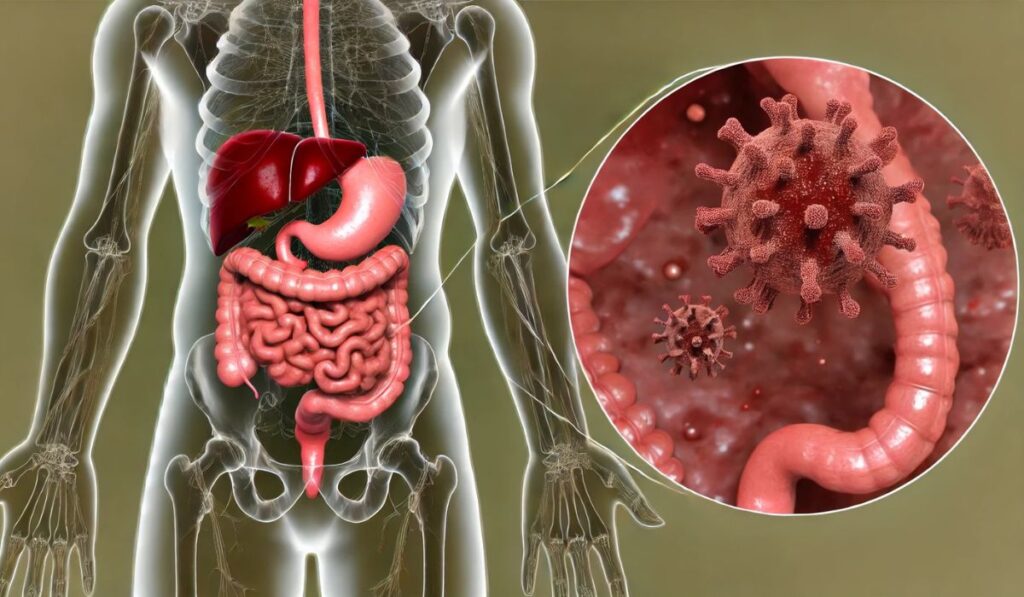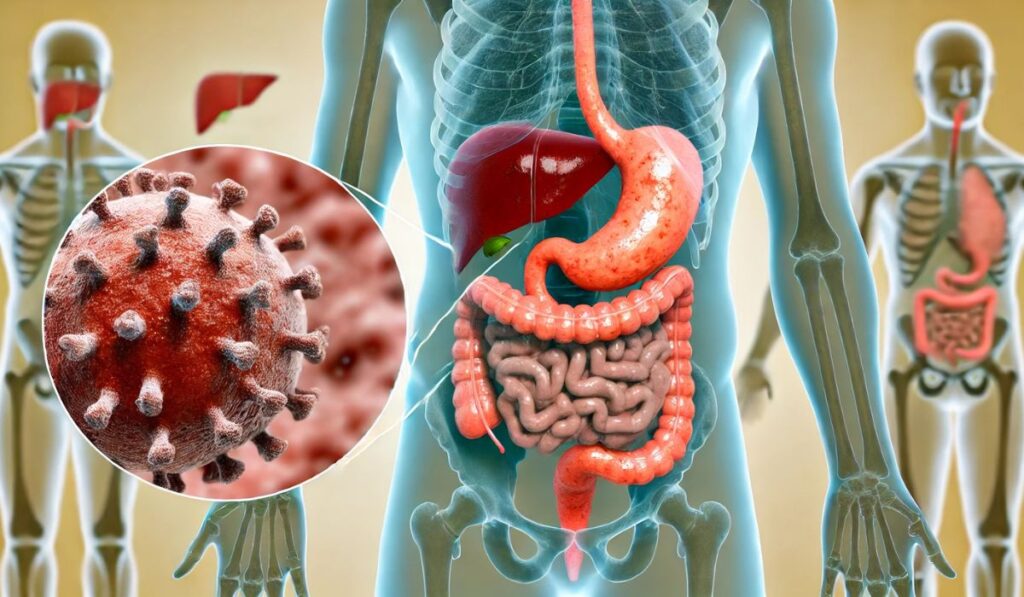Introduction to Gastroenteritis
Gastroenteritis is often called the stomach bug because it makes your stomach and intestines feel really sick. It’s like when you get a cold, but instead of your nose and throat being all stuffed up or sore, it’s your stomach that’s upset. This illness can make you feel really bad, with stomach aches, diarrhea, and even making you throw up.
Why Understanding Gastroenteritis Is Important
When you know the signs of gastroenteritis, you can start doing things to feel better sooner. If you start to feel stomach pains, or if you have to go to the bathroom a lot, or if you feel like you’re going to throw up, these could be signs. Knowing this helps because you can drink lots of water to keep from getting too thirsty, and you can rest until you start to feel better.
A Personal Story About Gastroenteritis
Once, my younger brother got gastroenteritis. It was not fun at all. He kept feeling like he needed to go to the bathroom, and he was really tired and weak. We were all worried because he was in so much pain and kept throwing up. My mom decided it was important to take him to see the doctor. The doctor told us that he caught a virus, which is a tiny germ that you can’t even see, that was making him sick. She told us to make sure he drank lots of fluids like water and to keep him in bed so he could rest.
We also had to make sure we washed our hands all the time. This was to keep the virus from spreading to the rest of us in the house. We followed the doctor’s advice, and after about a week, my brother started to feel better. That week taught us a lot about how to take care of someone with the stomach bug.
Remember, if you or a friend starts showing signs of gastroenteritis, take it seriously. Drinking plenty of water, resting, and keeping everything very clean can really help. And if you don’t start to feel better after a few days, it might be time to visit the doctor. This helps everyone get better quicker and stops the sickness from spreading to others.
Through this story, I hope you understand how common gastroenteritis is and learn what to do if it happens to you or someone close to you. It’s always good to know how to help and make things better when someone isn’t feeling well.
What is Gastroenteritis?
Gastroenteritis is a sickness that makes your stomach and intestines feel very bad. It is often called “stomach flu,” but it’s not the same as the regular flu. The regular flu makes you cough and feel bad in your chest and throat, but gastroenteritis makes your stomach hurt and makes you go to the bathroom a lot.

How Gastroenteritis Affects Your Body
When you have gastroenteritis, you might throw up, have diarrhea, and feel stomach pain. Sometimes you might have a fever or chills and feel very tired. It can make you feel so sick that you don’t want to eat anything. This can make you feel even weaker, so it’s very important to try to drink fluids like water or special drinks that help keep you hydrated.
Causes of Gastroenteritis
There are a few different things that can cause gastroenteritis. The most common cause is viruses like norovirus or rotavirus. You can catch these viruses from other people who are sick. Sometimes, eating food that has bad germs like bacteria, from things like raw meat or eggs, can also make you sick with gastroenteritis.
Treating Gastroenteritis
The main way to treat gastroenteritis is to drink lots of fluids. This helps your body stay hydrated and fight off the sickness. Most of the time, your body can get better on its own if you drink enough and rest. If the doctor thinks bacteria made you sick, they might give you medicine called antibiotics.
Personal Touch: A Family Story
Once, my younger cousin got really sick with gastroenteritis. He had to go to the bathroom a lot and couldn’t keep any food down. It was a tough few days. My aunt gave him lots of water and a special drink that helps you stay hydrated. After some rest and lots of fluids, he started to feel better. We all learned how important it is to wash our hands often and be careful about what we eat.
Keeping Healthy and Knowing the Difference
Knowing that gastroenteritis is different from the flu helps you get the right help faster. It’s good to understand what makes your stomach upset and what to do if it happens. Remember, drinking plenty of fluids, keeping clean, and eating safe foods are the best ways to stay healthy or get better if you catch gastroenteritis.
What Causes Gastroenteritis?
Gastroenteritis is a stomach problem that makes your stomach and intestines get swollen and irritated. Let’s talk about what can make this happen.
Viruses are a Common Cause
One big reason for gastroenteritis is viruses. Imagine tiny bugs that you can’t even see without a microscope. Two of the most common ones are called norovirus and rotavirus. These viruses are very easy to catch from other people who are sick, especially if everyone isn’t washing their hands well.
Bacteria Can Also Make You Sick
Bacteria are another kind of tiny bug that can make you sick. Some bacteria that often cause problems are called E. coli and Salmonella. People can get sick from these bacteria by eating food that isn’t cooked properly or drinking dirty water.
Other Things That Cause Trouble
Sometimes, other things can make your stomach and intestines upset. Here are a few:
- Parasites are tiny creatures that live in dirty water or food. They can get into your stomach and make you feel sick.
- Chemicals in some foods or water can also make your stomach hurt.
- If you eat something you are allergic to, like peanuts or milk, it can make your stomach upset. This is because of food allergies.
How Do You Know What Caused It?
Doctors can often tell what made you sick by looking at your symptoms and sometimes doing tests. If they know it’s a virus, they will tell you to rest and drink lots of fluids. If bacteria made you sick, they might give you medicine to help you get better. The best way to stay healthy is to always wash your hands and make sure your food and water are clean and safe. This helps keep those tiny bugs away from your stomach!
Symptoms of Gastroenteritis
Gastroenteritis, often called the stomach bug, is not a fun experience. It usually starts with your stomach feeling very upset. Here’s how you can tell if someone might have gastroenteritis:

Primary Symptoms:
- Diarrhea: This means going to the bathroom a lot with very loose and watery poop.
- Vomiting: This is when your body throws up whatever you’ve eaten because your stomach is irritated.
- Abdominal Cramps: These are painful feelings in your belly, like it’s being squeezed really hard.
Secondary Symptoms:
- Fever: You might feel hotter than usual and check a thermometer to see a high number.
- Headache: Your head might ache all over, making it hard to think or concentrate.
- Muscle Aches: Your muscles might feel weak and sore, even if you haven’t been doing a lot of moving around.
How Long Symptoms Last:
The symptoms of gastroenteritis can last a few days, usually about one to three days. If it’s caused by viruses like norovirus or rotavirus, you might start feeling sick within a day or two after you catch the bug. Sometimes, you might feel better one day and then feel worse the next day before you finally start feeling better for good.
Let me share a personal story to help explain how this feels. A while ago, during a family reunion, many of my relatives, including me, started feeling really sick one evening. It turned out that a stomach bug was going around. We all had symptoms like vomiting and diarrhea, and it wasn’t pleasant at all! We followed our doctor’s advice: we drank lots of fluids to stay hydrated, avoided solid foods at first, and slowly started eating bland foods like toast and rice. Thankfully, after a few days, we were all feeling better.
When you or someone in your family has these symptoms, it’s important to drink lots of fluids and rest. This helps your body fight off the infection. If the sickness doesn’t go away or gets really severe, seeing a doctor is a good idea. They might give medicines to help stop the vomiting or treat the infection, especially if it’s caused by bacteria.
Remember, gastroenteritis is very common and, while it makes you feel really bad for a few days, it usually gets better on its own with proper care. Always wash your hands well to help prevent catching or spreading the bug to others.
Diagnosing Gastroenteritis
How Gastroenteritis is Diagnosed
When you feel really sick with tummy troubles like diarrhea and vomiting, a doctor can check if you have gastroenteritis. They start by asking you about your symptoms and how you’ve been feeling. This is called a clinical evaluation. Next, the doctor might ask for a sample of your poop. This might sound a bit yucky, but it’s important because it helps them find out what’s making you sick. This test is called a stool test.
Why It’s Important to Know It’s Gastroenteritis
It’s really important for doctors to make sure that it’s gastroenteritis and not something else that’s making you feel ill. Some other sicknesses might look like gastroenteritis at first because they can also cause stomach pain and diarrhea. By knowing exactly what it is, the doctor can make sure you get the right help to feel better.
Treatment Options for Gastroenteritis

Caring for Yourself at Home
Most of the time, if you have gastroenteritis, you will need to stay at home and take care of yourself. Drinking lots of fluids is key because diarrhea and vomiting can make you lose a lot of water. You also need to eat safe and simple foods like toast and bananas that are easy on your stomach.
Medications for Gastroenteritis
Sometimes, the doctor might tell you to take medicine to help stop the vomiting or diarrhea. These medicines are called antiemetics for nausea and antidiarrheals for diarrhea. But remember, you shouldn’t take these medicines without talking to a doctor first because they might not always be a good choice. If bacteria made you sick, the doctor might give you antibiotics, but these won’t help if a virus is causing your gastroenteritis.
When You Should See a Doctor
Even though many times you can get better at home, there are times you really need to see a doctor. If you have a lot of pain, a high fever, or if you keep getting sicker instead of better, it’s important to get medical help. Also, if you can’t drink anything without throwing up, you should tell a doctor so they can help you stay hydrated.
Understanding the Importance of Early Diagnosis and Treatment
Getting the right diagnosis and starting the right treatment is very important. It helps you get better faster and prevents more serious problems. Remember, doctors are there to help you feel better when you have things like gastroenteritis. Always ask them questions if you’re not sure about what to do.
How Long Does Viral Gastroenteritis Last?
Typical Duration of Acute Symptoms
Viral gastroenteritis is often called the stomach bug and it usually doesn’t last long. Most people start feeling better after about one to three days. While sick, you might have diarrhea, throw up, or feel like your stomach hurts a lot. It’s very important to drink plenty of water and other clear drinks to keep from getting dehydrated, especially for children who can dehydrate much faster.
Factors That Can Prolong Recovery
Sometimes it can take longer to get better if your body isn’t very strong or if you have other sicknesses too. Also, if you try to eat normal or spicy foods too soon, you might feel sick for a longer time. When you start feeling a little better, eat simple foods like crackers, rice, or bananas first.
Preventing Gastroenteritis
Preventive Measures: Hygiene, Safe Food Practices
The best way to stop yourself from catching the stomach bug is to keep clean. Always wash your hands with soap and lots of water, especially after you use the bathroom and before you eat or make food. Make sure all your food is cooked the way it should be and don’t share cups or eating tools with others.
Vaccinations for Rotavirus and Other Preventive Tips
There’s a special shot called the rotavirus vaccine that can help stop one of the germs that cause gastroenteritis in young kids. This shot is given to babies when they are about two months old and then a few more times after that. It’s very good at protecting them. Also, try to stay away from people who are sick so you don’t catch their germs.
These tips are good to remember because they help keep you and everyone around you safe from getting sick. If you keep having stomach problems for more than a few days, it’s a good idea to talk to a doctor to make sure everything is okay.


